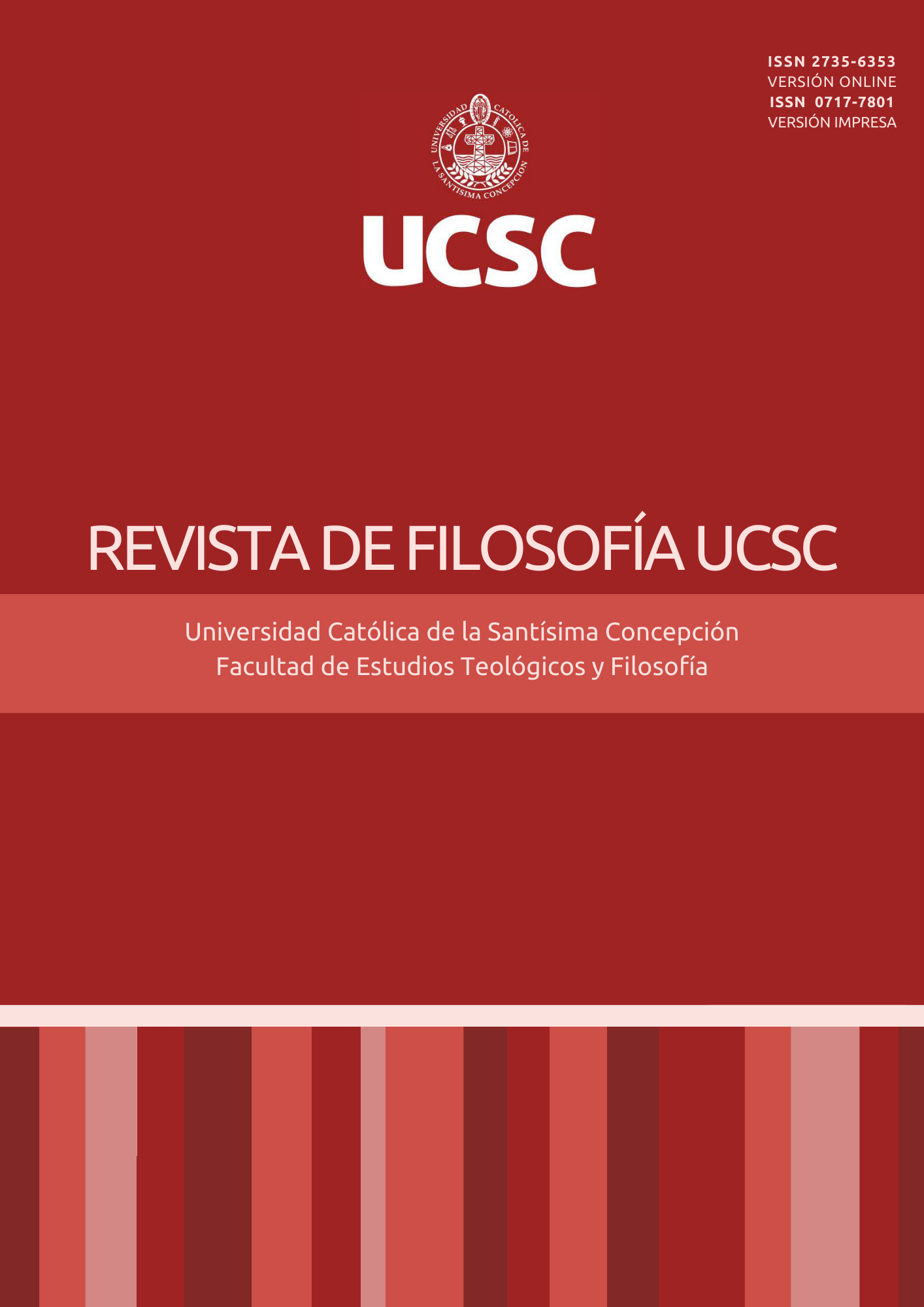Juridical-Economic Nature of the Free Act: Lay Inferences from Thomas Aquinas' Doctrine on Free Will
Main Article Content
Abstract
Christian thought, which holds that grace perfects nature rather than destroys it, does not preclude a secular-rational foundation of freedom, devoid of theological presuppositions. In this regard, we aim to revisit Thomas Aquinas' lesson on the free act, which can provide insights for this purpose. This paper will present the secular inferences that can be drawn from the genesis and development of the juridical and economic nature of the free act, as presented by Thomas. The study's development doesn't merely replicate but extends Thomas' philosophy, and while it may not employ the customary language of Thomistic studies, it remains faithful to his logic and thought.
Article Details
Section

This work is licensed under a Creative Commons Attribution-NonCommercial 4.0 International License.
The Revista de Filosofía UCSC is an open access journal and does not charge for publication. In addition, it regulates its Copyright and access policy according to the Creative Commons Attribution-NonCommercial 4.0 International Public License (CC BY-NC 4.0), therefore sharing (reproducing and distributing the material in any medium or format) and adaptation (modifying, transforming, and creating from the material) is allowed as long as proper credit is given and the citation is included with the corresponding data. Moreover, it is not allowed to use the material for commercial purposes.
How to Cite
References
Agustín, S. (1955). In Evangelium Iohannis, Obras completas XIII. Biblioteca de Autores Cristianos.
Agustín, S. (1956). De gratia Christi et de peccato originali, Obras completas VI. Biblioteca de Autores Cristianos.
Agustín, S. (1974). Las Confesiones. Biblioteca de Autores Cristianos.
Agustín, S. (1995). Ochenta y tres cuestiones diversas, Obras completas XL. Biblioteca de Autores Cristianos.
Aertsen, J. (2000). Filosofía cristiana: ¿Primacía del ser versus primacía del bien? Anuario Filosófico, 33, 339-361.
Aquino, T. (1951a). Suma contra Gentiles (tomo II). Club de Lectores.
Aquino, T. (1951b). Suma contra Gentiles (tomo IV). Club de Lectores.
Aquino, T. (1957). Suma Teológica (tomo I). Biblioteca de Autores cristianos.
Aquino, T. (2018). Suma Teológica (tomo III). Biblioteca de Autores cristianos.
Aquino, T. (s.f). Expositio libri Peryermeneias (libro 1). En: https://www.corpusthomisticum.org/cpe.html
Aquino, T. (s.f). De veritate (q. 22). En: https://www.corpusthomisticum.org/qdv2201.html.
Aquino, T. (s.f). Scriptum super Sententiis. En: https://www.corpusthomisticum.org/snp1001.html
Aquino, T. (s.f). De veritate (q. 1). En: https://www.corpusthomisticum.org/qdv01.html.
Aquino, T. (s.f). De veritate (q. 2). En: https://www.corpusthomisticum.org/qdv02.html.
Aquino, T. (s.f). Super Iob (13). En: https://www.corpusthomisticum.org/cio03.html
Aquino, T. (s.f). Super evangelium Ioannis (4). En: https://www.corpusthomisticum.org/cih03.html
Aquino, T. (s.f). Super evangelium Ioannis (8). En: https://www.corpusthomisticum.org/cih07.html.
Aquino, T. (s.f). Super Evangelium Ioannis (17). En: https://www.corpusthomisticum.org/cih13.html
Aquino, T. (s.f). Sententia libri Metaphysicae (l). En: https://www.corpusthomisticum.org/cmp0104.html
Arendt, H. (1998). La condición humana. Paidós.
Berger, P. (1999). The desecularization of the Worl: A Global Overview. En Peter L. Berger (Ed.) The Desecularization of the World. Resurgent religion and worl politics (1-18). Ethics and Public Policy Center.
Bonhoeffer, D. (2001), Resistencia y sumisión. Sígueme.
Chesterton, G. K. (1962). Ortodoxia. Planeta.
Chesterton, G. K. (1996). Santo Tomás de Aquino. Lohlé-Lumen.
Clavell, L. (1980). El nombre propio de Dios según santo Tomás de Aquino. EUNSA.
Fabro, C. (1969). Tomismo e pensiero moderno. Universitá Lateranense.
Fabro, C., Ocariz, F., Vansteenkiste C. &, Livi, A. (Eds.) (1980). Tomas de Aquino, también hoy. EUNSA.
Filippi, S. (2015). En torno a la metafísica del Éxodo. Studia Gilsoniana, 4 (2), 99-115.
Freud, S. (1992). Obras completas (tomo XIV). Amarrortu.
García Morente, M. (1987). Escritos desconocidos e inéditos. Biblioteca de Autores Cristianos.
Gilson, E. (1951). Maimonide et la Philosophie de l’Exode. Medieval Studies, 13, 223-225.
Gilson, E. (1952a). El espíritu de la filosofía medieval. Emecé
Gilson, E. (1952b). El realismo metódico. Rialp.
Gilson, E. (1989). El tomismo. Introducción a la filosofía de Santo Tomás de Aquino. Eunsa.
Gilson, E. (1991). El difícil ateísmo. Ediciones Universidad Católica de Chile.
Grabmann, M. (1948). La filosofía de la cultura de santo Tomás de Aquino. Poblet.
Guillet, J. (1993). Vocabulario de teología bíblica. Herder.
Heidegger, M. (1961). Nietzsche. Neske.
Hoffmann, T. & Michon, C. (2017). Aquinas on Free Will and Intellectual Determinism, Philosophers’ Imprint, 17 (10), 1-36.
Kant, I. (2004). Filosofía de la historia. Qué es la ilustración. Terramar.
Kelsen, H. (1960). Teoría pura del derecho. Eudeba.
Landsberg, P. L. (1933). L’homme et le language. Revue Philosophique de la France et de l’Etranger, CXV, 217- 251.
León XIII. (1958). Encíclica Aeternis Patris, en: Encíclicas pontificias. Colección completa. Guadalupe.
Macdonald, S. (1998). Aquinas’s Libertarian Account of Free Choice. Revue Internationale de Philosophie, 52, 309-328.
Martin Fisher, J., Kane, R., Pereboom, D. & Vargas, M. (2013). Cuatro perspectivas sobre la Libertad. Marcial Pons.
Molteni, A. (2007). Il sorriso di Beatrice. Introduzione alla Divina Commedia. Editrice Biblioteca dell’immagine.
Ocariz, F. (1980). Rasgos fundamentales del pensamiento de santo Tomás. En Fabro, C., Ocariz, F., Vansteenkiste, C. &, Livi, A. (Eds.), Tomas de Aquino, también hoy (47-89). Eunsa.
Pablo VI. (1975). Lettera del Santo Padre al Prof. Etienne Gilson. L’Osservatore Romano, 1-9.
Pasnau, R. (2002). Thomas Aquinas on Human Nature: A Philosophical Study of Summa theologiae. Cambridge University Press.
Péguy, C. (1987). Œuvres en prose complètes (vol. I). Gallimard.
Péguy, C. (1988). Œuvres en prose complètes (Vol. II). Gallimard.
Péguy, C. (1992). Œuvres en prose complètes (vol. III). Gallimard.
Péguy, C. (2014). Œuvres poétiques et dramatiques. Gallimard.
Pieper, J. (2005). Introducción a Tomás de Aquino. Rialp.
Pieper, J. (2017). Las virtudes fundamentales. Rialp.
Platón. (1992). Crátilo, en: Diálogos II. Gredos.
Rassam, J. (1980). Introducción a la filosofía de Santo Tomás de Aquino. Rialp.
Ratzinger, J. (2002). Introducción al cristianismo. Sígueme.
Rodriguez Rosado, J. & Rodriguez García, P. (eds.). (1975). Veritas et sapientia. En el VII Centenario de Santo Tomás de Aquino. EUNSA.
Sartre, J.P. (1947). Huis clos. Gallimard.
Shanley, B. (1998). Divine Causation and Human Freedom in Aquinas. American Catholic Philosophical Quarterly, 72, 99-122.
Velkley, R. (ed). (2007). Freedom and the Human Person. The Catholic University of America Press.




